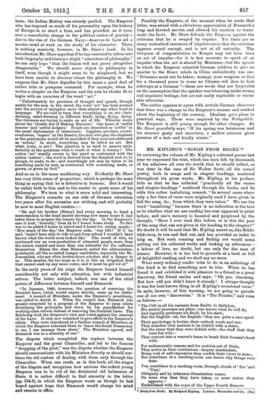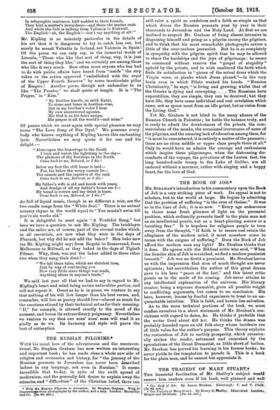MR. KIPLING'S " SONGS FROM BOOKS."*
IN reviewing the volume of Mr. Kipling's collected poems last year we expressed the wish, which has been felt by thousands of his admirers all over the world, that be should collect, as was done in the case of Sir Walter Scott, all the casual poetry, both in songs and in chapter headings, scattered throughout his prose works. Mr. Kipling, in his preface, tells us that he has collected "practically all the verses and chapter-headings " scattered through his books, and he adds this rather tantalizing remark, " In several cases where only a few lines of verse were originally used I have given iu full the song, &c., from which they were taken." We use the word " tantalizing " because there is no indication in the text as to whether what we are reading has ever appeared in print before, and one's memory iz; haunted and perplexed by the thought, " Have I ever read this before, or is this the part of the song that was not given in the heading to the chapter?" No doubt it will be said that Mr. Kipling meant us, like Rikki- tikki-tavy, to run and find out, and has provided an index to help us. But such running and finding out would mean getting out his collected works and looking up references— a labour of love, no doubt, but one only for the man of leisure. However, it is too bad to grumble at a book so full of delightful reading, and we shall say no more.
"What every ordinary reader tries to do in an anthology of this kind is to find something new to him. When he has found it and exhibited it with pleasure to a friend as a great discovery, the friend smiles and says: " Oh yes, charming. But how odd you didn't know it already ! I always thought it was the best-known thing in all Kipling's occasional verse." In spite, however, of this warning, we are going to parade one of our own "discoveries." It is "The Puzzler," and runs as follows :— " The Celt in all his variants from Builth to Ballyhoo,
His mental processes are plain—one knows what he will do, And logically predicate his finish by his start; But the English—ah, the English—they are quite a race apart.
Their psychology is bovine, their outlook crude and raw. They abandon vital matters to be tickled with a straw, But the straw that they were tickled with—the chaff that they were fed with— They convert into a weaver's beam to break their foeman's head with.
For undemocratic reasons and for motives not of State, They arrive at their conclusions—largely inarticulate. Being void of self-expression they confide their views to none ; But sometimes in a smoking-room one learns why things were done.
Yes, sometimes in a smoking-room, through clouds of `Era 'and
Obliquely and by inference illumination comes, On some step that they have taken, or some action they approve— Embellished with the argot of the Upper Fourth Remove.
• Bony. from Books. By Eadyard Kipling. London: Macmillan and Co. [6a.]
In telegraphic sentences, half nodded to their friends, They hint a matter's inwardness—and there the matter ends. And while the Celt is talking from Valencia to Kirkwall, The English—ah, the English I—don't say anything at all !"
Mr. Kipling is so minutely particular in the details of his art that it is dangerous to try to catch him out, but surely he meant Yalentia in Ireland, not Valencia in Spain! Of the poem we can only say, in the immortal words of Lincoln, "Those who like that sort of thing, why, it is just the sort of thing they like," and we certainly are among those who like it very much. How often must anyone who has had
to do with public affairs have beard from "inside" the step taken or the action approved "embellished with the argot of the Upper Fourth Remove" by some inarticulate pillar
of Empire ! Another poem, though not unfamiliar to us like "The Puzzler," we shall quote at length. It is "The Prayer," in " Kim."
"My Brother kneels, so saith Kabir, To stone and brass in heathen-wise, But in my brother's voice I hear My own unanswered agonies.
His God is as his fates assign, His prayer is all the world's—and mine."
Of poems which we meet again with special pleasure we may name "The Love Song of liar Dyal." We presume every- body who knows anything of Kipling knows this enchanting lyric. Nevertheless we may quote it for our and his delight :- "Alone upon the housetops to the North
I turn and watch the lightning in the sky— The glamour of thy footsteps in the North. Come back to me, Beloved, or I die !
Below my feet the still bazar is laid— Far, far below the weary camels lie— The camels and the captives of thy raid.
Come back to me, Beloved, or I die !
My father's wife is old and harsh with years, And drudge of all my father's house are I— My bread is sorrow and my drink is tears.
Come back to me, Beloved, or I die ! "
As full of liquid music, though in so different a vein, are the two cradle songs from the " White Seal." There is no animal nursery rhyme in the world equal to "You mustn't swim till you're six weeks old."
It is delightful to meet again "A Truthful Song," but here we have a question to ask Mr. Kipling. The bricklayer and the sailor are, of course, part of the eternal trades which, in all essentials, are now what they were in the days of Pharaoh, but why did he not add the baker? Men bake now (as Mr. Kipling might say) from Bogota to Samarcand, from Melbourne to Millwall, as they baked in the days of Tiglath Pileser. Why, then, was not the baker added to those other two when they sang their duet ?— " We tell these tales, which are strictest true, Just by way of convincing you How very little since things was made, Anything alters in anyone's trade."
We said last year all that we had to say in regard to Mr. Kipling's heart and mind being anima naturaliter poetica, and
will not repeat it. Great as he is in prose, we venture to say that nothing of his will live longer than his best verses, and, remember, will live as poetry should live—almost as much for the emotions stirred by their technical art as for their meaning. " If," for example, is attuned exactly to the mood of the moment, and hence its extraordinary poignancy. Nevertheless we venture to say that our sons' sons' sons will read it as gladly as do we. Its harmony and style will prove the best of antiseptics.















































 Previous page
Previous page